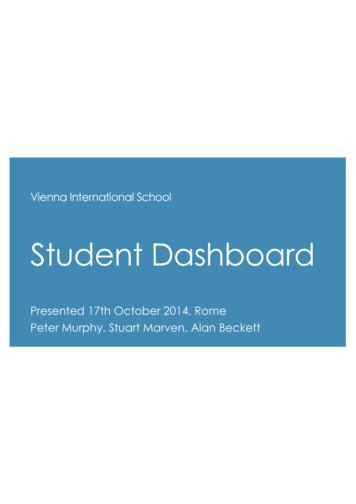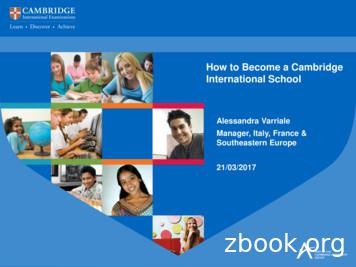IGCSE Literature In English Grade 11/Year 12
GRADE 11 LITERATURE IGCSE COURSE SYLLABUS2020-2021Course OutlineIGCSE Literature in EnglishGrade 11/Year 12Inspiring excellence, empowering global mindsOverviewThe Cambridge IGCSE Grade 11 Literature at GEMS Wesgreen International Secondary School willprovide learners with a solid foundation for further study. Cambridge IGCSE Literature in Englishoffers learners the opportunity to read, interpret, evaluate and respond to a range of literature inEnglish. The range includes drama, prose and poetry from the works of Shakespeare to contemporaryliterature. This course enables learners to deepen their understanding and appreciation of the waysin which writers use English to express meaning and achieve effects. Cambridge IGCSE Literature inEnglish will stimulate learners to read for pleasure and to explore wider and universal issues,promoting a better understanding of themselves and the world.Throughout the IGCSE course learners will be encouraged to practise their skills in close readingthrough the study of literary extracts; developing skills of analysis and interpretation of texts,alongside their expression of personal response to the texts studied. At Cambridge IGCSE levellearners will study two drama plays, ten poems and fifteen proses. Learners will explore theconventions of genres of texts and the contexts in which works have been written, read and received.Learning OutcomesThe aims of IGCSE Literature describe the purposes of the course based on this syllabus andsuggests how the student may be changed by the learning experience. Thus, enabling the studentsto: enjoy the experience of reading literature. understand and respond to literary texts in different forms and from different periodsand cultures. communicate an informed personal response appropriately and effectively. appreciate different ways in which writers achieve their effects. experience literature’s contribution to aesthetic, imaginative and intellectual growth. explore the contribution of literature to an understanding of areas of human concern.Assessment ObjectivesThe assessment objectives (AOs) are:1
GRADE 11 LITERATURE IGCSE COURSE SYLLABUS2020-2021AO1 Show detailed knowledge of the content of literary texts in the three main forms (drama,poetry and prose), supported by reference to the text.AO2 Understand the meanings of literary texts and their contexts and explore texts beyondsurface meanings to show deeper awareness of ideas and attitudes.AO3 Recognise and appreciate ways in which writers use language, structure and form to create andshape meanings and effects.AO4 Communicate a sensitive and informed personal response to literary texts.All questions in this syllabus assess the four assessment objectives: AO1, AO2, AO3 andAO4.Ongoing ObjectivesThere are objectives that are covered and built upon throughout each unit of work. These willhelp students develop skills and abilities including: Developing critical insight as well as subject knowledge with regard to the use transferable.Literary skills to produce polished final draft. Developing higher order thinking skills – analysis, critical thinking, problem solving. Presenting ordered and coherent arguments with supporting textual evidence. Developing independent learning and research. Developing confidence, especially in applying knowledge and skills in new situations. Building the vocabulary to discuss the subject conceptually and show how different aspectslink together. Unit OverviewsIGCSE level literature re-visits and integrates skills learnt at grade 10 IGCSE level, students engagein an intensive review to the course and gives an overview of the skills needed in this courseincluding analysis, note taking, essay writing techniques, and the use of embedded quotations.Key Concepts:The key concepts for Cambridge IGCSE level LanguageExploring the variety and use of language in literary texts. Identifying literary techniques andexplaining how their use contributes to a reader’s analysis and understanding of the text. Form2
GRADE 11 LITERATURE IGCSE COURSE SYLLABUS2020-2021Considering the ways in which writers use – or depart from – conventions of literary forms of prose,poetry and drama and how those inform meaning and effects. StructureWhen analysed in reading: the organisation of a text or passage, its shape and development and howthis contributes to the readers’ understanding of its meaning and effects. When used in writing:the construction of a relevant and supported argument appropriate to the question. GenreExploring the characteristics of different text types: for example, tragedy, comedy and satire. ContextExploring the relationship between a text and its historical, social and cultural backgrounds and theways in which this can illuminate the reading of a text. In response to unseen texts, considering theways in which a text’s meaning is shaped by conventions of form alongside those of language andstyle. StyleAnalysing the ways in which choices regarding form, structure and language interact to create adistinctive style, for different forms and genres. InterpretationoEvaluating and explaining different ideas within a text using textual support as evidence.These key concepts enrich teaching and learning, and help students develop a deep understandingand make links between different aspects. They open up new ways of thinking about lifeexperiences, understanding or interpreting the important themes be learned, and help studentsgain: A greater depth as well as breadth of subject knowledge. Confidence, especially in applying knowledge and skills in new situations.The vocabulary to discuss their subject conceptually and show how different aspects link together.A level of mastery of their subject to help them enter higher education.Term 1 Subject contentUnit 1 – Poetry: Selected poems from “Songs of Ourselves”, Volume 2Approximate length: 6-7 weeksIn this unit, learners will revise fifteen texts focusing on the key concepts for Cambridge IGCSELevel Literature in English, and practice answering a wide variety of essay questions.Kofi Awoonor, ‘The Sea Eats the Land at Home’Robert Bridges, ‘London Snow’3
GRADE 11 LITERATURE IGCSE COURSE SYLLABUS2020-2021Billy Collins, ‘Afternoon with Irish Cows’David Constantine, ‘Watching for Dolphins’William Cowper, ‘The Poplar-Field’Allen Curnow, ‘You will Know When You Get There’Gerard Manley Hopkins, ‘The Caged Skylark’Elizabeth Jennings, ‘In Praise of Creation’John Keats, ‘Ode on Melancholy’Philip Larkin, ‘Coming’Ruth Pitter, ‘Stormcock in Elder’Peter Reading, ‘Cetacean’Edna St Vincent Millay, ‘The Buck in the Snow’Charlotte Smith, ‘Written Near a Port on a Dark Evening’Alfred, Lord Tennyson, ‘The Kraken’Specific Curriculum Objectives Covered:Candidates must demonstrate the following: Knowledge and understanding of the set text they have studied and an appreciation ofrelevant contexts. Analysis of the ways in which writers’ choices shape meaning and create effects. An informed, independent opinion about the text studied.Appropriate communication of literary ideas and arguments.Unit 2 – Prose: Selected stories from “Stories of Ourselves”, Volume 2Approximate length: 4-5 weeksIn this unit, Learners will revise 10 set texts focusing on the key concepts for IGCSE LevelLiterature in English, and practice answering a wide variety of passage based or discursive essayquestions.Edgar Allan Poe, ‘The Fall of the House of Usher’Stephen Crane, ‘The Open Boat’Edith Wharton, ‘The Moving Finger’Ray Bradbury, ‘There Will Come Soft Rains’Alex La Guma, ‘The Lemon Orchard’Bernard MacLaverty, ‘Secrets’John McGahern, ‘The Stoat’Patricia Grace, ‘Journey’Janet Frame, ‘The Bath’Tim Winton, ‘On Her Knees’Specific Curriculum Objectives Covered:Candidates must demonstrate the following: Knowledge and understanding of the set text they have studied and an appreciation ofrelevant contexts.4
GRADE 11 LITERATURE IGCSE COURSE SYLLABUS2020-2021 Analysis of the ways in which writers’ choices shape meaning and create effects. An informed, independent opinion about the text studied.Appropriate communication of literary ideas and arguments.Term 2Unit 3 – DramaApproximate length: 4 weeksIn this unit, learners will review two set text focusing on the key concepts for Cambridge IGCSELevel Literature in English, and practice answering a wide variety of passage based and discursiveessay questions.1.The Crucible by Arthur MillerSpecific Curriculum Objectives Covered:Candidates must demonstrate the following: Knowledge and understanding of the set text they have studied and an appreciation ofrelevant contexts. Analysis of the ways in which writers’ choices shape meaning and create effects. An informed, independent opinion about the text studied.Appropriate communication of literary ideas and arguments.Unit 4 – DramaApproximate length: 4 weeks1.Twelfth Night by William ShakespeareSpecific Curriculum Objectives Covered:Candidates must demonstrate the following: Knowledge and understanding of the set text they have studied and an appreciation ofrelevant contexts. Analysis of the ways in which writers’ choices shape meaning and create effects.An informed, independent opinion about the text studied. Appropriate communication of literary ideas and arguments. Demonstrate, by informed discussion and opinion, an understanding of the ways in whichmeaning is expressed through a writer’s choices of language, form and structure. Knowledge and understanding of the text type which helps to inform a response.5
GRADE 11 LITERATURE IGCSE COURSE SYLLABUS2020-2021 Analysis of the ways in which writers’ choices shape meaning and create effects. An informed, independent opinion about the text studied. Appropriate communication of literary ideas and arguments.Term 3Unit 8 – Mock ExamsApproximate length: 4 weeksAssessmentBaseline Test: At the beginning of the academic year, the students write an internal andstandardized baseline test, which is used to measure progress.Formative: Throughout the year, the students complete past paper questions and project work whichallow the teachers to assess the students’ attainment and inform their planning.Summative: Each term the students write internal and standardized tests. At the end of term 1, thestudents sit for the EoT exams, which allow teachers to measure the students’ progress throughoutthe term. At the end of Term 2, the students sit for the Mock exams in preparation for the IGCSEexaminations. The teachers use this data to measure progress throughout the year and predict anIGCSE Grade.Action for blended learningDue to Covid-19 safety measures, we are following a blended model of remote and face-to-facelearning, which is technology-centred. In addition to the traditional copybook, we will use: GEMS Phoenix classroom.GCSE pods. Microsoft Office.Education websites and applications, such as Kahoot, Padlet, Pear Deck, etc. 6
IGCSE level literature re-visits and integrates skills learnt at grade 10 IGCSE level, students engage in an intensive review to the course and gives an overview of the skills needed in this course including analysis, note taking, essa
IGCSE First Language English 12 IGCSE World Literature 13 IGCSE English as a Second Language 14 . IGCSE Business Studies 19 IGCSE Global Perspectives 21 IGCSE Geography 22 IGCSE History 23 IGCSE Sciences 24 IGCSE Cambridge Mathematics Extended & Core 26 . At BISP, Year 12 and 13 (Key Stage Five) students study the IB Diploma Programme (IBDP .
IGCSE ARABIC for Native Arabic Speakers - Edexcel 11 GCSE ART & DESIGN - Edexcel 13 IGCSE BUSINESS STUDIES - Cambridge 15 IGCSE ECONOMICS - Cambridge 17 IGCSE COMPUTER SCIENCE - Cambridge 19 GCSE DRAMA - Edexcel 20 IGCSE ENGLISH LANGUAGE - Cambridge 22 IGCSE ENGLISH LITERATURE - Edexcel 22 IGCSE GEOGRAPHY - Edexcel 25
IGCSE English Literature and IGCSE First Language English Students begin a two-year course, covering two IGCSE subjects: 1) English Literature, and 2) First Language English. The study culminates in the examinations of the IGCSE papers set by the Cambridge International Examinat
Jul 14, 2015 · Cambridge IGCSE First Language English (0500) Edexcel English Literature Level 1/2 (KETO) Cambridge IGCSE English as a Second Language (0510) Aims English Language & English Literature In Years 10 and 11, all students with suitable ability will have the opportunity to study two related English courses: IGCSE
Teacher of Grade 7 Maths What do you know about a student in your class? . Grade 7 Maths. University Grade 12 Grade 11 Grade 10 Grade 9 Grade 8 Grade 7 Grade 6 Grade 5 Grade 4 Grade 3 Grade 2 Grade 1 Primary. University Grade 12 Grade 11 Grade 10 Grade 9 Grade 8 Grade 7 Grade 6 Grade 5 . Learning Skill
University of Cambridge International Examinations London GCE AS/A-Level / IGCSE / GCSE Edexcel International. 6 Examination Date in 2011 Cambridge IGCSE Oct/Nov X 9 Cambridge GCE / May/Jun 9 9 London GCE London GCSE May/Jun 9 X Chinese London IGCSE Jan X 9 Cambridge IGCSE / May/Jun 9 9 London IGCSE London GCE Jan 9 9 Cambridge GCE Oct/Nov X 9 Private Candidates School Candidates Exam Date. 7 .
Upcoming Cambridge IGCSE training in Rome 05-06 April 2017 Introductory Cambridge IGCSE English as a Second Language (0510) Introductory Cambridge IGCSE International Mathematics (0607) Introductory Cambridge IGCSE Art and Design (0400) Extension Cambridge IGCSE Geography (0460) 07-08 April 2017
Second Language IGCSE examination. Students wishing to study either the A1 Language and Literature, or English B course for the IB Diploma at either Standard or Higher level, will be expected to achieve at least a B grade at IGCSE. IGCSE First Language English























